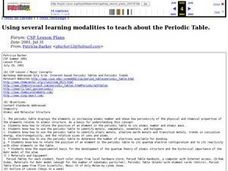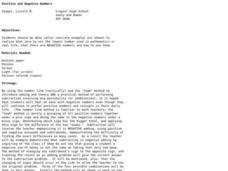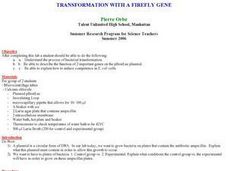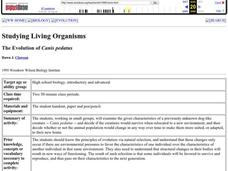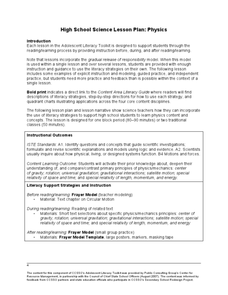Curated OER
Homology
Students investigate the concept of homology. They are particularly interested in finding information about developmental homology. Students design a new animal correcting obvious mistakes on a worksheet provided by the teacher. They...
Curated OER
Using several learning modalities to teach about the Periodic Table.
Students identify how to relate the position of an element in the periodic table to its atomic number and atomic mass. They identify how to use the periodic table to identify metals, semimetals, nonmetals, and halogens, and also,...
Curated OER
Positive and Negative Numbers
Learners discover negative numbers and how to use them by using the number line and the "team" method.
Curated OER
Understanding the Layers of the Earth
Fourth graders explore the three layers of the Earth describing the composition, thickness, and temperature of each layer. Layers are compared and contrasted and data unearthed placed into graphic organizers.
Curated OER
The Declaration of Independence
Students explore the Declaration of Independence and the Bill of Rights. They research a philosopher using reference books and reliable
Internet sources and write a two-page paper utilizing proper writing conventions. In addition, they...
Curated OER
Natural Selection in Protected And Unprotected Populations
Studnets compare how two elephant seal populations fare during successive generations. They participate in a simulation using a card game to look at the differences in two populations, one that is protected from mortality by human...
Curated OER
Field Of Beans
High schoolers investigate the concept of crop farming. They plant small fields to test different theories of agriculture. Students keep care over the fields, including pest and weed control. High schoolers make and record daily...
Curated OER
Erosion And the Cycling of Rocks And Minerals
Students investigate the concept of erosion by water in a problem solving activity. In small groups, they are assigned either sand, potting soil or rocks to construct a mountain that will hold up to a sprinkler can of water dripping on...
Curated OER
Heart Mountain Relocation Center
Students examine several primary source documents related to the Japanese internment camp at Heart Mountain, Wyoming. They write an essay about Heart Mountain and explore the concept of restitution to Japanese-Americans.
Curated OER
Surface Water Supplies And The Texas Settlements
Students engage in a lesson that is concerned with the allocation and finding of water resources. The location of different settlement areas is considered as one looks how the water is distributed. They map some of the early Spanish and...
Curated OER
Transformation With A Firefly Gene
Students understand the process of bacterial transformation through experimentation. They describe the function of two important genes of the pBestLuc plasmid. They explain how to induce competence in E. coli cells.
Curated OER
Who We Are
Students analyze population data and trends in Canada over a given amount of time. As a class, they are introduced to the concept of dependency load and use a population pyramid to calculate the figure. Using the internet, they...
Curated OER
Primate Characteristics and Exaptation
Pupils compare the features of gorilla to humans. In this biology instructional activity, students simulate adaptation using materials found in the classroom. They explain what exaptation means.
Curated OER
Blocks And Screws (or "screwy Contrivances")
Learners, given a block of wood and a screw or nail, are asked to put that screw or nail into a block. They examine how many contrivances and other imperfections found in living things are best explained by the process of evolution.
Curated OER
13 Ways to Tell Time Backwards
Students explore different ways geological time can be measured: comparing the time dimensions for each method, the mechanisms of each method, and the materials used.
Curated OER
Why Do We Need Vitamin C in Our Diet?
Learners compare/contrast the DNA sequence data of the rat GULO gene to the inactive human GULO gene. They translate and align the sequences, and propose a scenario to explain the occurrence of an inactive DNA sequence to that of an...
Curated OER
The Evolution of Canis pedatus
High schoolers examine the given characteristics of a previously unknown dog-like creature, Canis pedatus, to decide if the creatures would survive when relocated to a new environment. They work in small groups to decide whether or not...
Curated OER
The Evolution of Canis pedatus
Students, in groups, examine the given characteristics of a previously unknown dog-like creature, Canis pedatus. They discuss whether or not this species would show adaptations and survive if it were relocated to a new environment.
Curated OER
Circular Motion
Twelfth graders discuss centrifugal force, frictional force, and critical speed as it relates to the popular amusement park ride, the Gravitron.
Curated OER
Ancient Egypt/Mummification/Preservation
Sixth graders identify characteristics of preserved artifact, distinguish between an example and non-example of a preserved artifact, and connect the definition of preserve to the Egyptian art of mummification.
Pennsylvania Department of Education
Associative Properties
Students investigate the associative property of addition. In this associative property of addition lesson plan, students work in pairs and build addition problems with six blocks. They sit on either side of a desk so that they can...
Curated OER
Edible Color Wheels
Students create an edible color wheel using cookies and frosting. They mix tints into frosting to simulate the color of the color wheel.
Curated OER
Miami Metrozoo & Mathematics
Twelfth graders use Algebra and Geometry to solve a real life problem at the Zoo.
Virginia Department of Education
Charles’ Law
Searching for a relatively interesting way to demonstrate Charles' Law? Here is a lesson in which pupils heat air inside a flask and then cool the flask to quickly cool the air. They make observations about what occurs during the cooling...



